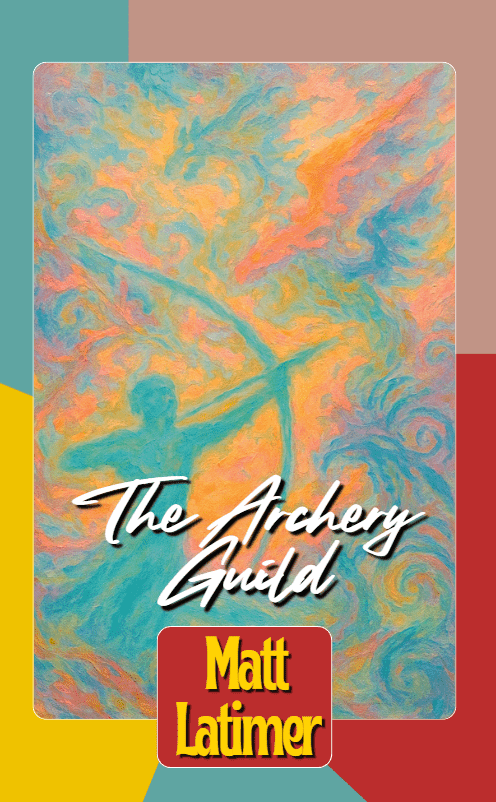Editorial Review

Matt Latimer’s short stories read like late talk around a small kitchen table after rain. You can hear the coat drip in the hall and the kettle sigh. You can see the bow propped by the door, clean and ready for morning. The voice does not strain. It carries the plain truth of people who work with their hands and know that craft, taken day by day, shapes a life. His Archery Guild series shows a world where skill is a kind of prayer, where luck cuts both ways, and where love, when it comes, steadies the shot.
A word about the writer, because it helps to place the work. Latimer writes short, tight pieces that rarely run long. Each story holds close to the bone. He works inside a living world with its own laws and music. There is a larger saga humming in the walls. The Archery Guild stands at the centre, not as a club for show, but as a trade with codes, customs, and a hard won sense of humour. He also writes longform set in the same ground, and you can feel that in the way side doors open to other rooms. Yet he never lets the lore drown the people. He brings you into a scene, sets a task, and trusts you to walk it with him. He writes like a maker. He files to fit. He sands the splinters. He leaves a clean edge.
The best of these stories reach for grace without softening the world. I think first of “Tegfan’s Bow,” which carries a father’s journey from raw force to earned strength. A young man finds a longbow no soldier can pull. He grows, fights, marries, and learns to stand easy in his own skin. Years pass. His hands, once hot with anger, learn patience. There is a small, human detail at the heart of it that could be a line from a family story told by the fire. He binds his arrow flights with strands of his daughters’ hair to keep himself steady, “something about the scent” guiding him back to himself. When he lifts the impossible bow again, it answers. “As his children had quelled him,” Latimer writes, “so too had the scent of his daughter’s hair tamed this bow.” Those few words do more than pages of talk about growth. They show a man who changed his way of being and then found that the world, in its own shy way, changed its grip on him.
That sort of tenderness sits right beside grit throughout the collection. “Expeditionary” offers another fine example. A squad pushes through a lethal zone to claim a wondrous emerald bow. The route is lined with sly hazards: webs that shine like gems and still cut, hungry birds with a wicked taste, old traps that remember old wars. The crew plan, sweat, and bleed for the prize. When they finally pry it free, the commander turns it over in his hands and says, with a wry grin that lands like a truth you can’t dodge, “It’s left-handed.” The joke is simple and it hits hard. It speaks to every plan that ran straight and still bent at the end. It honours the courage of people who walk into the dark for a better day and still find that the door swings the other way. This is Latimer in full control: humour with bite, danger with detail, and a final beat that widens the theme without one ounce of fuss.
“Line Cutter” starts with the kind of joy anyone who shoots will know: a field day, friends, light ribs, a bit of rivalry over rings and scores. Jarvi Little-Wolf, long past his peak, warms to the bow and the chat. The grass is underfoot, tea on the tongue, the air easy. Then politics creeps in. Rules, which begin as fair play, grow teeth. The tone shifts by degrees, never by a shout, and before you know it the story has you asking what a point is worth and what it might be used to justify. The final choice in that piece stays with you, not because the author leans on it, but because he refuses to gild it. He allows it to stand, plain as a marker on a field, and the reader feels the ground tip.
The same patient craft guides “Show of Power.” The plan is clever: a staged display meant to cut a swaggering leader down to size. Sparks fly, the trick lands, and then the edge of reality slides a fraction, just enough to turn shame into harm. Amid the smoke and shock, a character looks at the wreckage and says, “Somewhere during the building process, we’ve misread something…” That single line carries the weight of a hundred reports. It is the voice of people who meant well, measured wrong, and now must sweep up. It is also the voice of grown work, the kind that looks at a ruin, reports the cause without drama, and then takes the next right step.
Latimer never forgets that a bow is a tool that tells the truth. It answers to breath and form and the mind behind the hands. “Chanjion” drives that home with style. Fog swallows the field. Commander Sumiko Akabane rides out alone. Sight fails. Sound speaks. Horses betray the invisible line. She counts, draws, looses. The men on the wall call each clean fall as if they were scoring a match at the local ground. There is a comic beat that keeps the steel from turning cold. When asked for numbers, a veteran says, “Between numerous and many.” When the archers break the tension with a shout—“Why did the Gods create the Tevaller?”—the answer rolls back, “Because killing animals is cruel!” The joke lands and the steel lands too. You feel both courage and craft in each arrow’s flight. The scene believes in practice. It cherishes that small pleasure when you know, at release, that the shot is true.
The world itself has a real texture. There are battlemages at the edge of a lane and a knife-woman who moves like fate. There are notes from the Master of Crows, a hard-used mind with a quill, setting down field wisdom and warnings for the next poor soul sent down the same path. These small documents salt the book with the feel of a working guild. You sense the lockers and ledgers and the kindly spite of veterans who insist you wear your guard because they like you alive. The best fantasy carries the sense that tools have owners and owners have habits. Latimer knows this to his core. He also knows how to hold a scene in the pub, which is its own kind of stage. A favourite among the shorter pieces brings a bounty hunter and a weary runner to the same table. The talk is clean, wary, and oddly gentle. “I’ll do you a deal,” the hunter says, and the room seems to lean closer. No one raises a voice. No one makes a speech. The choice, when it comes, tastes of paperwork and relief. It reads like the truth: lives often turn on a quiet bargain and the courage to take it.
One of the great pleasures of the series is the way it honours ordinary jokes. Earnest work and grim stakes need the laugh that cuts the edge. That might be a wry look at fog thick enough to drown numbers. It might be the shrugging wisdom in a guild hall. It might be the short line that restores a bit of air after a heavy page. Latimer never forces the smile. He lets it rise from the scene, and then he moves on. His sentences rarely draw attention to themselves, yet they carry small sparks. A training den offers an “amber glow,” and at once you can smell wax and sweat. Arena dust catches in light and becomes “its own poetry,” and the word stands for pride as much as sight. An arrow passes a man’s cheek and he breathes the scent of his child’s hair. These are not tricks. They feel like things noticed in passing by someone who has spent time around bows, crowds, and old halls. They feel like notes a writer might jot at the back of a match program and later slip into a scene.
The moral core of the work is steady. Luck swings, and plans bend, yet effort counts. Skill matters. Care with small things builds a kind of justice that grand speeches cannot deliver. The collection shows this again and again. An exhausted team keeps a promise. A woman who never asked to fight stands in an arena and chooses courage. An old soldier knows when to shut up and when to help. A leader learns that “show” is a cheap tool that breaks in the hand. None of this is offered with a lecture. The stories trust the reader. They choose clear stakes, then let action speak. There is also a distinct rhythm in the dialogue. It sounds like people who work and tease and take the hard bit on the chin. Orders come plain. Praise comes rare and thus heavy. The jokes hide in the seam of stress and care. No one wastes breath. Even titles and names carry a mix of pride and play. You will meet Jarvi Little-Wolf, Commander Sumiko Akabane, Aeker Murdock, and Premier-types who believe in their own shine. The names have shape. They fit the people they stand for. If I were to mark a few favourite passages for TIFAM readers to seek out and keep, I would start with three lines that show the range. From “Expeditionary,” the perfect capstone to a bruising quest: “It’s left-handed.” From “Chanjion,” the fog report to end all fog reports: “Between numerous and many.” From “Show of Power,” the grown-up summary of how good plans turn sharp: “Somewhere during the building process, we’ve misread something…” Each one works as a laugh or a wince on first read. Each one gains force when you sit with it. Each one reveals a writer who trusts scale and tone.
The story “Lost, Yet Still on Course” deserves a special word as well. Taryn Harel, a Celebrant, steps into a roaring arena that would swallow a timid soul. She is no fighter and yet there she stands, guided by vow and old belief. The crowd wants heat. The gods want honour. The bow in her hands is more than wood and string. The piece moves with calm steps from noise to grace, and the closing act feels like a blessing given in a perilous place. It shows how far the series can travel without losing the grit of real action. When Latimer writes battle, he stays honest about cost. “Damage Control” puts us behind a stone slab with an archer, breath ragged, bolts spent, danger coming from two sides. Help arrives with a blur of motion and leaves a quiet shock in its wake. The blades drink blood not to boast, but because habits grow in men the way moss grows on stone. The detail lands without fuss, and that makes it sting more. The craft of archery itself is never window dressing. It shapes choices and speech. It teaches calm under strain. It builds friendship through shared labour. It gives people a thing to hand down. That’s why “Tegfan’s Bow” feels like a signature work. It takes the lore of an impossible weapon and turns it into a family story. It links technique to love. It says, in a voice as old as any field, that strong hands are meant to protect, and that the best strength comes from a soft place.
Readers will also enjoy the small field notes and side texts that dot the book. The Master of Crows writes with the scorched patience of a person who has seen too much and still comes to work. There are bits of monster lore, warnings about cursed gear, and reminders to check your kit twice. These moments make the world feel used. They hint at warehouses, training yards, and the weary gallows humour of staff who know that the monster you underestimate is the one that bites.
As for the line-by-line craft, Latimer keeps a steady tempo. He favours clear verbs and images you can hold. He lets pauses do their work. He trusts the reader to meet him halfway. He knows when to stop a scene and leave aftertaste. This last skill matters most in the short form. Endings are where many stories lose their nerve. Here, they land like arrows that hit and then hum a little while in the straw. I admire the restraint in the way magic is handled. It exists, carries rules, and surprises at the worst time, yet it never steals the show. People make choices. Bodies tire. Arrows miss. A fine trick can shear into harm if pride stands at the controls. This grounded approach suits a magazine readership that values honest sport, clear effort, and the shared delight of getting a thing right. I also admire the book’s humour, which refuses to punch down. The laughs come from craft, timing, and the strange ways a day can turn. A leader walks into his own trap. A veteran draws a circle around fog with one dry phrase. A bounty hunter offers mercy and a ride home. Even the sharpest joke carries a kind of affection. That tone feels true to the ranges and clubs where people tease each other into better form and better lives.
What stands, after all the arrows fly and all the talks end, is a belief in practice. Draw. Anchor. Loose. Make each step a little cleaner. When you fall short, own it and try again. When luck favours you, treat it as a guest, not a right. When love arrives, let it make your hands safe. The Archery Guild stories turn this simple ethic into rich reading. They give you the thrill of a clean shot and the warmth of good company. They give you a world you can visit in a lunch break and carry in your head the rest of the day. For new readers, I’d point to “Tegfan’s Bow” for heart, “Chanjion” for the joy of skill under pressure, “Line Cutter” for the way small rules can grow teeth, “Expeditionary” for a hard laugh earned the honest way, and “Lost, Yet Still on Course” for a quiet kind of courage. Each one wears its own face and still belongs to the same house. Each one shows the writer’s pleasure in detail and his trust in the reader.
Matt Latimer writes like a man who has watched and listened. He hears the scrape of a boot in a corridor, the lift in a friend’s voice at the line, the hush that falls when a shot lands true. He writes with respect for work and a calm faith in change. He invites us to sit, to hear a story told straight, and to leave with one good line still ringing. His Archery Guild series aims true. It hits, again and again, in ways that feel earned and kind. For TIFAM’s readers and for anyone who loves a clean sentence, a lived world, and a story that trusts the heart, this book is a welcome companion. It reminds us that even in hard seasons, there are crafts that keep us upright, and there is always a next shot worth taking.
This article is part of our free content space, where everyone can find something worth reading. If it resonates with you and you’d like to support us, please consider purchasing an online membership.



